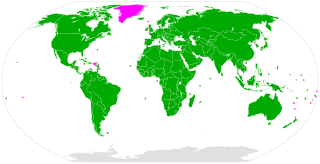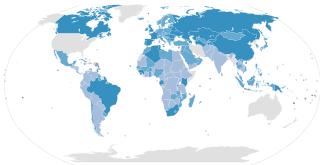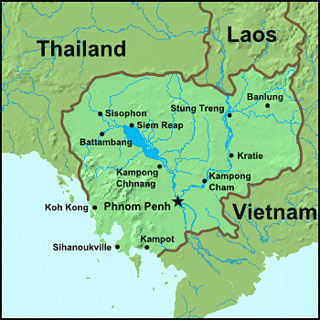Related Research Articles

The International Labour Organization (ILO) is a United Nations agency whose mandate is to advance social and economic justice by setting international labour standards. Founded in October 1919 under the League of Nations, it is the first and oldest specialised agency of the UN. The ILO has 187 member states: 186 out of 193 UN member states plus the Cook Islands. It is headquartered in Geneva, Switzerland, with around 40 field offices around the world, and employs some 3,381 staff across 107 nations, of whom 1,698 work in technical cooperation programmes and projects.

The Convention Concerning the Prohibition and Immediate Action for the Elimination of the Worst Forms of Child Labour, known in short as the Worst Forms of Child Labour Convention, was adopted by the International Labour Organization (ILO) in 1999 as ILO Convention No 182. It is one of eight ILO fundamental conventions.

The ILO Convention Concerning Minimum Age for Admission to Employment C138, is a convention adopted in 1973 by the International Labour Organization. It requires ratifying states to pursue a national policy designed to ensure the effective abolition of child labour and to raise progressively the minimum age for admission to employment or work. It is one of eight ILO fundamental conventions. Convention C138 replaces several similar ILO conventions in specific fields of labour.

The Forced Labour Convention, the full title of which is the Convention Concerning Forced or Compulsory Labour, 1930 (No.29), is one of eight ILO fundamental conventions of the International Labour Organization. Its object and purpose is to suppress the use of forced labour in all its forms irrespective of the nature of the work or the sector of activity in which it may be performed. The Convention defines forced labour as "all work or service which is exacted from any person under the menace of any penalty and for which the said person has not offered himself voluntarily", with few exceptions like compulsory military service.
The Freedom of Association and Protection of the Right to Organise Convention (1948) No 87 is an International Labour Organization Convention, and one of eight conventions that form the core of international labour law, as interpreted by the Declaration on Fundamental Principles and Rights at Work.
The Right to Organise and Collective Bargaining Convention (1949) No 98 is an International Labour Organization Convention. It is one of eight ILO fundamental conventions.
Invalidity, Old-Age and Survivors' Benefits Convention, 1967 is an International Labour Organization Convention.

Abolition of Forced Labour Convention, 1957, the full title of which is Convention concerning the Abolition of Forced Labour, 1957, is one of the eight ILO fundamental conventions of the International Labour Organization, which cancels certain forms of forced labour still allowed under the Forced Labour Convention of 1930, such as punishment for strikes and as a punishment for holding certain political views.
Final Articles Revision Convention, 1961 is an International Labour Organization Convention.
Labour Inspection (Agriculture) Convention, 1969 is an International Labour Organization Convention.
Accommodation of Crews Convention, 1970 is an International Labour Organization Convention. It was ratified by the ILO's Governing Body in Geneva October 14, 1970, as a supplement to the Accommodation of Crews Convention (Revised), 1949.

The Occupational Cancer Convention is an International Labour Organization Convention on workplace safety standards against occupational cancer, established in 1974 during the 59th session of the Interlnational Labour Conference. The convention entered into force in 1976 after ratification of Ecuador and Hungary.
Occupational Health Services Convention, 1985 is an International Labour Organization Convention.

Asbestos Convention, 1986 is an International Labour Organization Convention, adopted at the 72nd session of the International Labour Conference.
Seafarers' Welfare Convention, 1987 is an International Labour Organization Convention.
Work in Fishing Convention (2007) C 188, was adopted at the 96th International Labour Conference (ILC) of the International Labour Organization ILO in 2007. The objectives of the Convention is to ensure that fishers have decent conditions of work on board fishing vessels with regard to minimum requirements for work on board; conditions of service; accommodation and food; occupational safety and health protection; medical care and social security. It applies to all fishers and fishing vessels engaged in commercial fishing operations. It supersedes the old Conventions relating to fishermen.

The Maritime Labour Convention (MLC) is an International Labour Organization (ILO) convention, number 186, established in 2006 as the fourth pillar of international maritime law and embodies "all up-to-date standards of existing international maritime labour Conventions and Recommendations, as well as the fundamental principles to be found in other international labour Conventions". The other pillars are the SOLAS, STCW and MARPOL. The treaties applies to all ships entering the harbours of parties to the treaty (port states), as well as to all ships flying the flag of state party (flag states, as of 2021: over 91 per cent).

The Convention on Domestic Workers, formally the Convention concerning Decent Work for Domestic Workers is a convention setting labour standards for domestic workers. It is the 189th ILO convention and was adopted during the 100th session of the International Labour Organization, in 16 June 2011. It entered into force on 5 September 2013.

Child labour refers to the full-time employment of children under a minimum legal age. In 2003, an International Labour Organization (ILO) survey reported that one in every ten children in the capital above the age of seven was engaged in child domestic labour. Children who are too young to work in the fields work as scavengers. They spend their days rummaging in dumps looking for items that can be sold for money. Children also often work in the garment and textile industry, in prostitution, and in the military.
International labour law is the body of rules spanning public and private international law which concern the rights and duties of employees, employers, trade unions and governments in regulating Work and the workplace. The International Labour Organization and the World Trade Organization have been the main international bodies involved in reforming labour markets. The International Monetary Fund and the World Bank have indirectly driven changes in labour policy by demanding structural adjustment conditions for receiving loans or grants. Issues regarding Conflict of laws arise, determined by national courts, when people work in more than one country, and supra-national bodies, particularly in the law of the European Union, has a growing body of rules regarding labour rights.